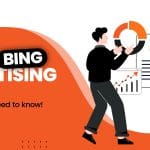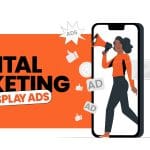In this fast-paced digital world where advertisements constantly bombard customers and businesses or brands shout for attention, rising above the ever-growing tide of competitors can be challenging.
Moreover, research shows that 40% of internet users use an ad-blocker, which highlights that traditional outbound marketing tactics aren’t as effective anymore. Considering how much businesses spend on paid ads, it can be a major loss and exhausting.
Therefore, including inbound marketing, a transformative approach in your marketing strategies is crucial. Inbound b2b marketing has proven time and time again to excel in this changing landscape of digital marketing. By crafting an effective inbound marketing plan, you can set your business up for quality lead generation, email marketing, SEO (search engine optimization), higher ROI, and increased website traffic.
The world of B2B marketing strategies has changed, and the behavior of professional service buyers has shifted. Today’s buyers are nearly as likely to turn to search engines for their work-related challenges as they are to ask a connection or colleague for a referral.
This evolving marketplace and consumer behavior has broadened the range of b2b inbound marketing tactics. Therefore, staying competitive today requires taking full advantage of a wide spectrum of inbound marketing strategies.
However, if you are wondering which ones work in today’s hyper-competitive environment, this blog is for you. In this blog, we will explore ten fundamental b2b inbound marketing strategies that will not only help your business keep up but also help you get ahead.
Before diving into the best B2B marketing strategies, first, let’s define exactly what a B2B marketing strategy is.
What is B2B Inbound Marketing, and Why is it Important?
B2B Inbound Marketing is the process of encouraging and attracting prospects and users from other businesses to engage with your business by providing them with desired resources which can include content like a whitepaper, blog post, quiz, or even a tool for some kind of analysis.
The benefit of inbound marketing is that it brings customers to you looking for help, advice, and a solution in the form of a service or a product instead of you having to continually hunt down your ideal target audience. And here you win half of the battle!
Inbound B2B marketing is an indirect way to promote your services online. It doesn’t involve loud commercials, unsolicited emails, cold calls, or anything else.
B2B inbound marketing is crucial because it’s extremely efficient, cost-effective, and fits the budgets and scope of B2B companies quite well. This marketing strategy works towards building relationships with potential customers and nurturing them through every phase of the buyer’s journey.
Examples of some inbound marketing channels include:
- Social media marketing (SMM)
- Search engine optimization (SEO)
- Webinars
- Video marketing (like YouTube and TikTok)
Key Components of Inbound Marketing Strategy for B2B Businesses
1. Goals, Objectives & KPIs
When assessing your b2b inbound marketing strategy, you’ll want to align it with the company’s growth goals outlined by leadership, such as increasing sales in one of your target markets or increasing overall revenue. After communicating these macro-level business goals with your marketing and sales teams, it is crucial to set SMART goals and KPIs. Ask yourself questions like; What goals do you want to achieve that you weren’t able to achieve with a traditional marketing approach? why are you adopting an inbound marketing strategy?
2. Competitive Benchmarking
Understanding how you stack up against competitors gives you a perspective on which inbound activities (e.g., emails, blogging, social engagement, etc.) your business needs to help maintain or gain competitive ground. Being an early adopter of inbound strategies in your market provides a great chance to make inroads with your best customers, while businesses that are late to the game can benefit from seeing which areas where they lack or fall short as compared to their competitors.
3. Positioning
Positioning plays a crucial role in driving all marketing efforts because, without it, you can’t articulate why your product or service is important, and how it matters to your target audiences.
It helps you clearly define your best potential customers, what your company, service, or product will deliver, and provide evidence to support the claim.
4. Buyer Personas
Buyer personas paint a vivid picture of the exact “person” you’re targeting with your inbound marketing efforts by clearly defining their background, roles and responsibilities, key motivations, personality, goals, challenges/pain points, etc.
5. Buyer’s Journey
There is a sales funnel that depends majorly on a buyer’s journey. Here is the breakdown;
- The consideration stage is when a person is eager to connect with a human being to talk about the product after they’ve researched multiple options.
- In the Awareness stage, businesses choose straightforward ways to outline the problem and suggest solution angles such as briefs, tip sheets, guides, blogs, and overviews.
- In the Decision stage, companies choose formats that help the customers to articulate value. It may include; case studies, vendor features, free assessments, service comparisons, and product literature.
- In the Experience stage “how-to” formats typically work best, including blogs, briefs, FAQs, guides, specific overviews, or knowledge base articles.
6. Budget
Lastly, budget is also a key component for establishing an effective inbound marketing strategy. However, it will ultimately be based on the timeframe expected for achieving your growth goals. Every program is different because every business is different. Hence, the budget for different programs and businesses may vary. However, when budgeting for inbound, it is crucial to include everything from your team resources to tools like marketing automation software, your website hosting and CMS, CRM, and outside support.
Conclusion
However, it is crucial to consider all the key components of B2B marketing while implementing effective strategies ranging from email marketing and influencer In conclusion, B2B marketing is evolving at a very accelerating rate. Companies and businesses that equip themselves to understand how quickly the marketplace is changing and how their audience buying behavior is evolving succeed in making their services and products thrive in any economic environment.
collaborations to SEO and social media.
Marketing is a complex domain therefore it requires to be dealt with by experts for yielding optimum results. If you want to get in touch with such experts, Hashe Agency can help. We have the best-in-class talent to perform effective inbound marketing for B2B businesses.
So, what are you waiting for? Reach out to us for more information.






